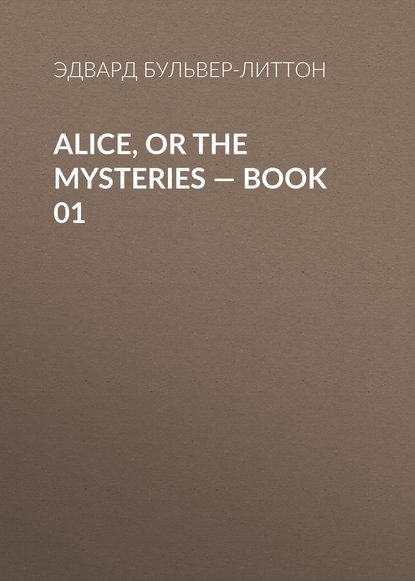 Полная версия
Полная версияAlice, or the Mysteries — Book 01
The carriages were at the door before the party had assembled at the melancholy breakfast-table. Lord Vargrave was the last to appear.
"I have been like all cowards," said he, seating himself,—"anxious to defer an evil as long as possible; a bad policy, for it increases the worst of all pains,—that of suspense."
Mrs. Merton had undertaken the duties that appertain to the "hissing urn." "You prefer coffee, Lord Vargrave? Caroline, my dear—"
Caroline passed the cup to Lord Vargrave, who looked at her hand as he took it—there was a ring on one of those slender fingers never observed there before. Their eyes met, and Caroline coloured. Lord Vargrave turned to Evelyn, who, pale as death, but tearless and speechless, sat beside her mother; he attempted in vain to draw her into conversation. Evelyn, who desired to restrain her feelings, would not trust herself to speak.
Mrs. Merton, ever undisturbed and placid, continued to talk on: to offer congratulations on the weather,—it was such a lovely day; and they should be off so early; it would be so well arranged,—they should be in such good time to dine at——-, and then go three stages after dinner; the moon would be up.
"But," said Lord Vargrave, "as I am to go with you as far as——-, where our roads separate, I hope I am not condemned to go alone, with my red box, two old newspapers, and the blue devils. Have pity on me."
"Perhaps you will take Grandmamma, then?" whispered Caroline, archly.
Lumley shrugged his shoulders, and replied in the same tone,—
"Yes,—provided you keep to the proverb, 'Les extremes se touchent,' and the lovely grandchild accompany the venerable grandmamma."
"What would Evelyn say?" retorted Caroline.
Lumley sighed, and made no answer.
Mrs. Merton, who had hung fire while her daughter was carrying on this "aside," now put in,—
"Suppose I and Caroline take your britzka, and you go in our old coach with Evelyn and Mrs. Leslie?"
Lumley looked delightedly at the speaker, and then glanced at Evelyn; but Mrs. Leslie said very gravely, "No, we shall feel too much in leaving this dear place to be gay companions for Lord Vargrave. We shall all meet at dinner; or," she added, after a pause, "if this be uncourteous to Lord Vargrave, suppose Evelyn and myself take his carriage and, he accompanies you?"
"Agreed," said Mrs. Merton, quietly; "and now I will just go and see about the strawberry-plants and slips—it was so kind in you, dear Lady Vargrave, to think of them."
An hour had elapsed, and Evelyn was gone! She had left her maiden home, she had wept her last farewell on her mother's bosom, the sound of the carriage-wheels had died away; but still Lady Vargrave lingered on the threshold, still she gazed on the spot where the last glimpse of Evelyn had been caught. A sense of dreariness and solitude passed into her soul: the very sunlight, the spring, the songs of the birds, made loneliness more desolate.
Mechanically, at last, she moved away, and with slow steps and downcast eyes passed through the favourite walk that led into the quiet burial-ground. The gate closed upon her, and now the lawn, the gardens, the haunts of Evelyn, were solitary as the desert itself; but the daisy opened to the sun, and the bee murmured along the blossoms, not the less blithely for the absence of all human life. In the bosom of Nature there beats no heart for man!
1
"All our reasoning reduces itself to yielding to sentiment."



